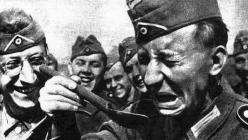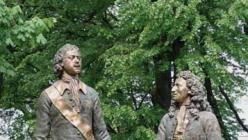The Bunins leave for Odessa. Second Pushkin Prize. Paris office of I.A. Bunin. Literary merits of the writer. Anna Tsakni in the year of marriage with I. A. Bunin. Ivan Alekseevich Bunin. Voronezh. Ludmila Alexandrovna Bunina. Paris. I.A. Bunin. Vera Muromtseva. Pushkin Prize. And the wind, and the rain, and the haze over the cold desert of water. Ivan Bunin and Varvara Pashchenko. The history of the creation of the poem. poetic world Bunin.
"Biography of Ivan Bunin" - Prose and poetry of I.A. Bunin is a single text. Father, Alexey Nikolaevich Bunin. Bunin. The Nobel Prize is 10 million SEK. Preservation of the best traditions classical literature. The Bunins moved to a small resort town. He and his sister Masha ate black bread. TO literary creativity Ivan Alekseevich returned slowly. I.A. Bunin is the last Russian classic. Ivan Alekseevich made his last diary entry on May 2, 1953.
"Themes of Bunin's creativity" - The meaning of Bunin. Bunin and Tolstoy. The Story of the Village. Bunin and Zhukovsky. Magazine "Knowledge". Wednesday. Bunin and Shalamov. On the work of I.A. Bunin. I.A. Bunin. The word of the exile. Collection "Leaf fall". Traveled in Russia. Art diary "Cursed days". Honorary Academician of the Russian Academy of Sciences. Childhood. Nobel Prize.
"Biography of Bunin Ivan Alekseevich" - Journey to Germany. Rose of Jericho. Odessa. Last days. South of Russia. Emigrant period. Alexei Nikolaevich Bunin. The gymnasium where Bunin did not finish his studies. Dark alleys. Hard work time. Ludmila Alexandrovna Bunina. Bunin's prose. Vanya from birth was different from other children. Bunin became the first Russian Nobel Prize winner. English language. Nobel Prize. Bunin and Pashchenko.
“April bright evening burned out” - In the morning, spring will come into its own. Signs of spring: Greenery - shoots. Bunin conveyed natural changes on the verge of light and shadow. During the lesson, determine: Human feelings, animation appear in personifications. The image of nature in the poem. I.A. Bunin. “April bright evening burned out…” (1892). I.A. Bunin is considered consummate master words. Bunin conveys the sounds of spring with the help of a special poetic method of sound painting.
"Easy breathing" - Olya Meshcherskaya. Portrait. Critics of the novel. Conflict. Carelessness, courage, unbridled happiness. Reckless behaviour. Conclusions. "EASY BREATH" Author Gavrilova Valentina Nikolaevna Teacher of the highest category. Lives without fear of being misunderstood. The talent to live beautifully, wrong, but interesting, small, but bright and easy!!! The problem of love has not yet been developed in my works. Now I have only one way out...
Countless fiery eyes The ships were barely visible behind the snow to the Devil, who was watching from the rocks of Gibraltar, from the stony gates of the two worlds, behind the ship leaving into the night and blizzard. The Devil was huge as a cliff, but even bigger than him was the ship, many-tiered, many-trumpeted, created by the pride of a New Man with an old heart. On its uppermost roof rose alone among the whirlwinds of snow those cozy, dimly lit chambers, where, immersed in a sensitive and anxious drowsiness, its overweight driver, resembling a pagan idol, sat over the whole ship. He heard heavy howls and furious squeals of a siren choked by a storm, but he calmed himself by the proximity of that, ultimately for him the most incomprehensible, what was behind his wall of that large, as it were, armored cabin, which every now and then was filled with a mysterious rumble, trembling and dry crackling blue lights flashing and bursting around a pale-faced telegraph operator with a metal half-hoop on his head. At the very bottom, in the underwater womb of the Atlantis, the thousand-pound bulks of boilers and all kinds of other machines oozed dully with steel, steam whistled and oozed with boiling water and oil, that kitchen, heated from the bottom by infernal furnaces, in which the movement of the ship was cooked, - terrible in their concentration bubbling forces transmitted to its very keel, into an infinitely long dungeon, into a round tunnel, weakly illuminated by electricity, where slowly, with an overwhelming human soul rigorously, a gigantic shaft rotated in its oily bed, like a living monster stretching in this tunnel, similar to a vent. And the middle of "Atlantis", its dining rooms and ballrooms poured out light and joy, buzzed with the dialect of an elegant crowd, fragrant with fresh flowers, sang with a string orchestra. And again writhing painfully and sometimes convulsively collided among this crowd, among the brilliance of lights, silks, diamonds and naked female shoulders, a thin and flexible pair of hired lovers: a sinfully modest, pretty girl with lowered eyelashes, with an innocent hairstyle and a tall young man with black, as if with glued hair, pale from powder, in the most elegant patent leather shoes, in a narrow tailcoat with long tails - a handsome man, like a huge leech. And no one knew either that this couple had long been bored with pretending to suffer their blissful torment to shamelessly sad music, or that the coffin stands deep, deep below them, at the bottom of the dark hold, in the vicinity of the gloomy and sultry bowels of the ship, heavily overcoming the darkness, the ocean, the blizzard...
A gentleman from San Francisco - no one remembered his name either in Naples or Capri - went to the Old World for two whole years, with his wife and daughter, solely for the sake of entertainment.
He was firmly convinced that he had every right to rest, to pleasure, to a long and comfortable journey, and who knows what else. For such confidence, he had the reason that, firstly, he was rich, and secondly, he had just embarked on life, despite his fifty-eight years. Until that time, he had not lived, but only existed, though not badly, but still placing all his hopes on the future. He worked tirelessly - the Chinese, whom he ordered to work for him by the thousands, knew well what this meant! - and, finally, he saw that a lot had already been done, that he was almost equal to those whom he had once taken as a model, and decided to take a break. The people to whom he belonged used to start enjoying life with a trip to Europe, to India, to Egypt. He did and he did the same. Of course, he wanted to reward himself first of all for the years of work; however, he was also happy for his wife and daughter. His wife was never particularly impressionable, but all elderly American women are passionate travelers. And as for the daughter, an aged and slightly sickly girl, for her the trip was absolutely necessary - not to mention the health benefits, isn't there happy meetings in travel? Here sometimes you sit at the table or look at the frescoes next to the billionaire.
The route was developed by a gentleman from San Francisco extensive. In December and January, he hoped to enjoy the sun of southern Italy, the monuments of antiquity, the tarantella, the serenades of itinerant singers and what people at his age feel! Especially subtly - with the love of young Neapolitan women, even if not entirely disinterested, he thought of holding a carnival in Nice, in Monte Carlo, where at that time the most selective society flocks - the very one on which all the benefits of civilization depend: and the style of tuxedos , and the strength of thrones, and the declaration of war, and the well-being of hotels - where some enthusiastically indulge in automobile and sailing races, others in roulette, others in what is commonly called flirting, and fourth in shooting pigeons, which soar very beautifully from the cages over the emerald lawn, on the background of the sea the color of forget-me-nots, etc.
...Here is an excerpt from the book.
Only part of the text is open for free reading (restriction of the copyright holder). If you liked the book full text can be obtained from our partner's website.
A. Blok Answers: B8 symbolism B9 robber beauty B10 anaphora B11 comparison B12 iambic
A. Block C3. What is the contradictory attitude of the poet towards Russia? C4. What works of Russian poets are close to Blok's feeling of Russia? (Justify your answer) С3. What gives central image poems artistic brightness and depth? C4. In what works of Russian poets is the image of Russia recreated and what are their similarities and differences with the poem by A.A. Blok? C5.3. What is the nature of disclosure love theme in the lyrics of A. A. Blok? C5.3 What is the peculiarity of the sound revolutionary theme in the poetry of A.A. Blok? C5.3 As in the lyrics of A.A. Blok displayed the past and present of Russia? C5.3. How does the finale of A.A. Block "Twelve" is related to its main content?
A. Blok About valor, about exploits, about glory I forgot on the woeful earth, When your face in a simple frame Shined before me on the table. But the hour has come, and you left the house. I threw the cherished ring into the night. You gave your fate to another, And I forgot the beautiful face. The days flew by, spinning like a cursed swarm... Wine and passion tormented my life... And I remembered you in front of the lectern, And I called you like my youth... I called you, but you didn't look back, I shed tears, but you did not descend. You sadly wrapped yourself in a blue cloak, On a damp night you left the house. I don't know where your pride is sheltered You, dear, you, gentle, have found... I sleep soundly, I dream of your blue cloak, In which you left on a damp night... No longer dream of tenderness, of glory, Everything is over youth is gone! Your face in its simple frame With my hand I removed from the table. A.A. Block, 1908
A. Blok B 8. Indicate the modernist trend in the poetry of the late XIX - early XX century, prominent representative which was A.A. Block. Q 9. What is the name of a stylistic device based on the use of the same vowel sounds and giving the verse a special expressiveness: About valor, about exploits, about glory I forgot on the sorrowful earth, When your face in a simple frame Shined before me on the table?
A. Blok B 10. What is the name of the consonance of the ends of poetic lines (for pride - blue; for glory - frame, etc.)? Q 11. What figurative and expressive means, based on the correlation of objects and phenomena, does the poet use in the line: “And he called you as his youth”? B 12. What are the names of figurative definitions that serve as a means artistic expressiveness("woeful earth", "beautiful face")?
A. Block Answers: B8 symbolism B9 assonance B10 rhyme B11 comparison B12 epithet
A. Blok I enter the dark temples C3. What is the meaning of identifying Rus' with the image of a woman ("Oh my Rus'! My wife!") in the lyrics of A.A. Blok? C4. Tell us about the main and favorite techniques that A. Blok used in his works. Who else among the poets used the same techniques in their works? Stranger C3. What is the meaning of identifying Rus' with the image of a woman ("Oh my Rus'! My wife!") in the lyrics of A.A. Blok? C4. Motherland theme. Its evolution in the work of A. Blok. What other poets Silver Age did they also sing of their homeland? Restaurant C3. In what artistic images embodied the poet's ideas about love? C4. What feelings is filled with the poem "In the restaurant" and in what way is it consonant with the love lyrics of other Russian poets? About valor, about exploits, about glory С3. How did the ring composition of the poem help the poet show the drama of love? C4. In what works of Russian poets is the drama of unrequited love depicted, and in what way can these works be compared with the poem by A. A. Blok? On the Kulikovo field C3. What gives grounds to attribute the considered poem by A. A. Blok to philosophical lyrics? C4. Which of the Russian poets addressed the theme of Russian history, and in what ways are their works comparable with the above poem by A. A. Blok?
A. Block
slide 1
Description of the slide:
slide 2
Description of the slide:
slide 3
Description of the slide:
slide 4
Description of the slide:
slide 5
Description of the slide:
slide 6
Description of the slide:
Slide 7
Description of the slide:
Slide 8
Description of the slide:
Slide 9
Description of the slide:
Slide 10
Description of the slide:
I. Bunin C1. What is the main idea of the story by I. A. Bunin? C2. In what works domestic classics the theme of "spiritual deadness" sounds and what brings them closer to the story "The Gentleman from San Francisco"? The Kuragin family in Tolstoy's novel, In The Master and Margarita, they are all there, the first is Berlioz. Lots of these types. Chekhov has "Ionych", Bunin "A gentleman from San Francisco, Goncharov" Oblomov. " Dead Souls"Gogol.
slide 11
Description of the slide:
I. Bunin C5. What are moral lessons story by I.A. Bunin "The Gentleman from San Francisco"? How is the author's position expressed in I.A. Bunin "The Gentleman from San Francisco"? What, in your opinion, is the tragedy of the protagonist of the story, I.A. Bunin "The Gentleman from San Francisco"? How do the eternal and momentary relate in the story of I.A. Bunin "Mr. from San Francisco"? "Woe to you, Babylon, strong city!" How do you think, to what extent was the idea of these terrible words from the Apocalypse reflected in I. Bunin's story "The Gentleman from San Francisco"? Why are all those sailing on the ship "Atlantis" (both idle rich and exhausted sailors) doomed to death? C5.3 How is the theme of earthly and eternal revealed in I. A. Bunin's prose? C5.3. Why main character story by I.L. Bunin "The Gentleman from San Francisco" has no name?
slide 12
Description of the slide:
slide 13
Description of the slide:
Slide 14
Description of the slide:
slide 15
Description of the slide:
slide 16
Description of the slide:
Slide 17
Description of the slide:
Slide 18
Description of the slide:
Slide 19
Description of the slide:
Slide 20
Description of the slide:
M. Gorky C1. What character traits of the hero can be revealed by this fragment of the text? C2. In the works of which Russian writers (poets, playwrights) the theme of pride, vanity and "superiority, perhaps imaginary" resounds, and in what way do these works are consonant with the legend of the "son of an eagle"? C5.3 How is the ideal and anti-ideal of a person displayed in M. Gorky's story "Old Woman Izergil"? C5.3. Which moral questions solves M. Gorky in the story "Old Woman Izergil"? C5.3. What is the role of composition in disclosure ideological content M. Gorky's story "Old Woman Izergil"? C5.3. What features of romanticism are inherent in the story of M. Gorky "Old Woman Izergil"?
slide 21
Description of the slide:
slide 22
Description of the slide:
slide 23
Description of the slide:
slide 24
Description of the slide:
Slide 25
Description of the slide:
slide 26
Description of the slide:
Slide 27
Description of the slide:
Slide 28



